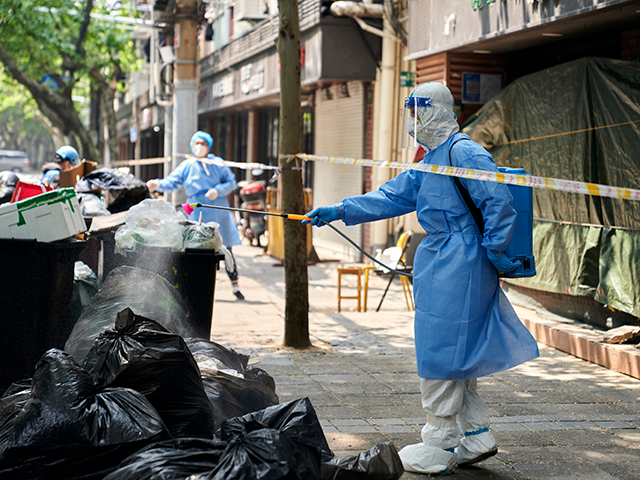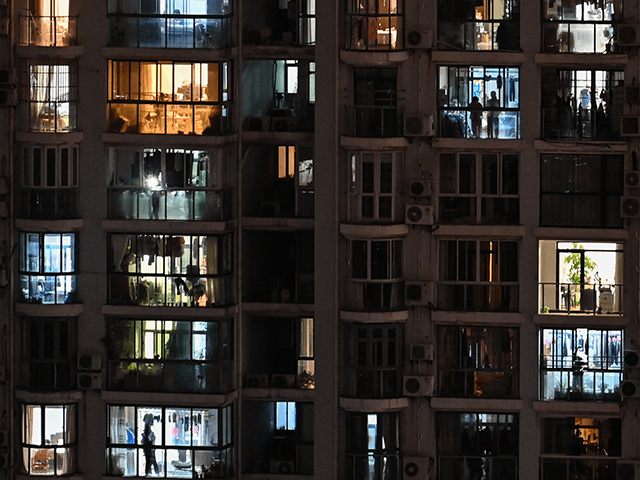Shanghai officials announced in a press conference on Sunday that they would begin to lift the month-long total lockdown of China’s largest city “in phases,” claiming only some businesses would enjoy the right to function and leaving open the possibility for a renewed mass house arrest order at any time.
The press conference followed reports over the weekend that Communist Party officials had begun to retire some of the city’s notorious coronavirus quarantine centers because they could not find enough people testing positive for Chinese coronavirus or exposed to the disease to populate them. The centers – reportedly kept in poor sanitary conditions and forcing those suspected, but not confirmed, of having the virus to remain in close quarters with confirmed cases – had prompted global embarrassment and civil unrest at home.
Of particular concern was the practice of separating babies and small children from their parents; scenes of three or four babies tossed into one crib and unsupervised toddlers outraged locals and prompted enough pressure that Communist Party officials reluctantly announced exceptions to family separations in April.
Remarks from Shanghai Deputy Mayor Chen Tong on Sunday indicated that the Communist Party was announcing some reopenings out of concern for its economy. After destroying the Hong Kong economy by illegally implementing communism, the Party now relies heavily on Shanghai as its global investment center and saw investors flee in droves in the face of the unpredictable and poorly explained lockdown.
“Shanghai is set to restart business and services activities in phases from Monday, with shopping centers, supermarkets, pharmacies, wet markets, catering and hairdressing services to resume offline operations in an orderly manner,” Chen announced, according to the state-run newspaper Global Times. “The resumption of commerce and business activities will progress in phases on the principle of orderly openness, limited flow, effective control and classified management.”
The Times noted that the communist regime is still strictly limiting which businesses can operate any anyone seeking a license will need to “provide business licenses, negative results for nucleic acid tests and antigen tests and other application materials. They also need to take nucleic acid tests regularly after business resumption.”
Horror from Shanghai! https://t.co/0mOJF1mAy4
— Breitbart News (@BreitbartNews) April 11, 2022
The onerous requirements likely mean that small businesses more vulnerable to extreme economic damage from the lockdowns will not have the resources to operate anytime soon.
Officials at the press conference warned that the gradual opening-up the Communist Party is promising does not mean a return to normal anytime soon. They insisted, according to the South China Morning Post, that Shanghai would return to “normal virus control” only on June 1, despite the pronounced drop in officially documented coronavirus cases that made an announcement of gradually reopening allegedly possible. The Morning Post highlighted that officials claimed they would “remain vigilant to prevent any rebound in new cases,” suggesting they could pause or reverse the announced slow reopening at any time.
The Hong Kong-based newspaper also noted that Shanghai does not appear to be preparing for a return of public transport or allowing private cars to use roads in the near-term, meaning “employees cannot return to office to work.”
The Shanghai lockdown appears to have caused marked strife within the Communist Party itself. The Global Times, a mouthpiece of Party opinion, had claimed that officials would not totally lock down Shanghai because it was simply too economically significant to the country and the people who lived there were too wealthy and powerful.
“It is not exaggeration to say that if Shanghai were put under citywide, strict closed-off management, the results will cascade into a significant negative impact on the whole Chinese economy as well as certain aspects of the global economy,” the Global Times proclaimed in an article published in March.
Shortly after the article appeared, dictator Xi Jinping appeared to personally intervene to impose a total lockdown and punish officials resisting it. Xi sent top Politburo enforcer Sun Chunlan to the city in early April to berate local officials and ensure the implementation of a total lockdown and mass house arrest of citizens.

Workers in protective gear disinfect a pile of garbage bags on Thursday, April 21, 2022, in Shanghai. (AP Photo/Nico de Rouge)
“Chinese Vice Premier Sun Chunlan, after visiting quarantine centers, makeshift hospitals, nucleic acid tests centers and communities, urged the city to adopt stricter attitude,” the Global Times reported at the time, “more thorough measures, and swifter actions, to ratchet up building of makeshift hospitals, expand isolation venues, and strictly follow guidelines in order to defeat COVID-19.”
In early May, Xi held a meeting of top Communist Party officials to personally scold his underlings on “the importance of unswervingly adhering to the dynamic zero-COVID [Chinese coronavirus] policy and resolutely fighting any attempts to distort, question or dismiss China’s anti-COVID [Chinese coronavirus] policy.”
While China has long faced questions regarding the accuracy of government coronavirus case tallies, even the Party’s documented case numbers appeared not enough to merit a full lockdown to many international observers.
At the top of that list last week was World Health Organization (W.H.O.) Director-General Tedros Adhanom Ghebreyesus, who called China’s lockdown policy “not sustainable” in response to a question from the news agency Reuters last week.
The Communist Party responded by censoring his comments on Weibo, the government-controlled social media outlet, and banning even posting photos of Tedros’ face. The Global Times condemned Tedros as “irresponsible” and “not knowledgeable” for his remarks.

COMMENTS
Please let us know if you're having issues with commenting.